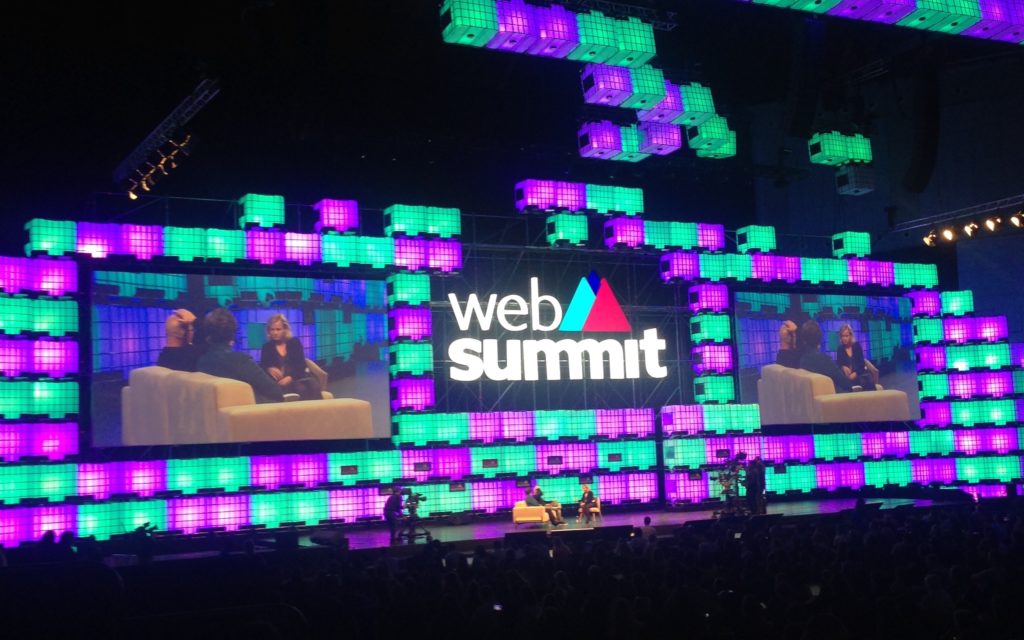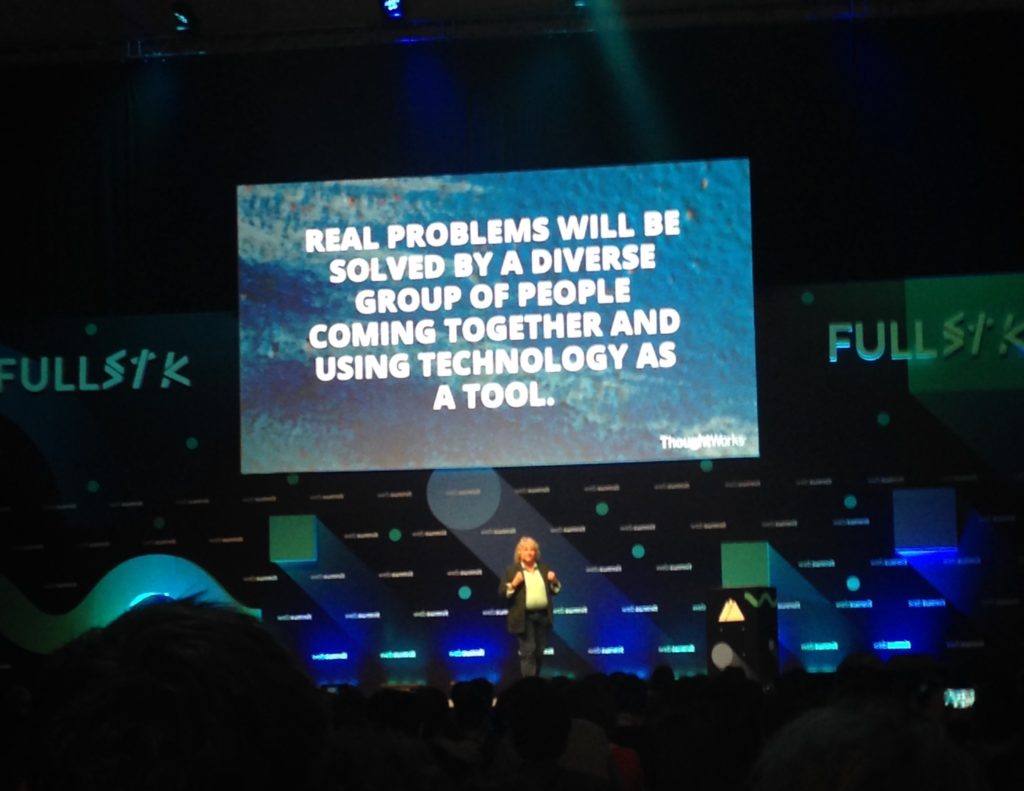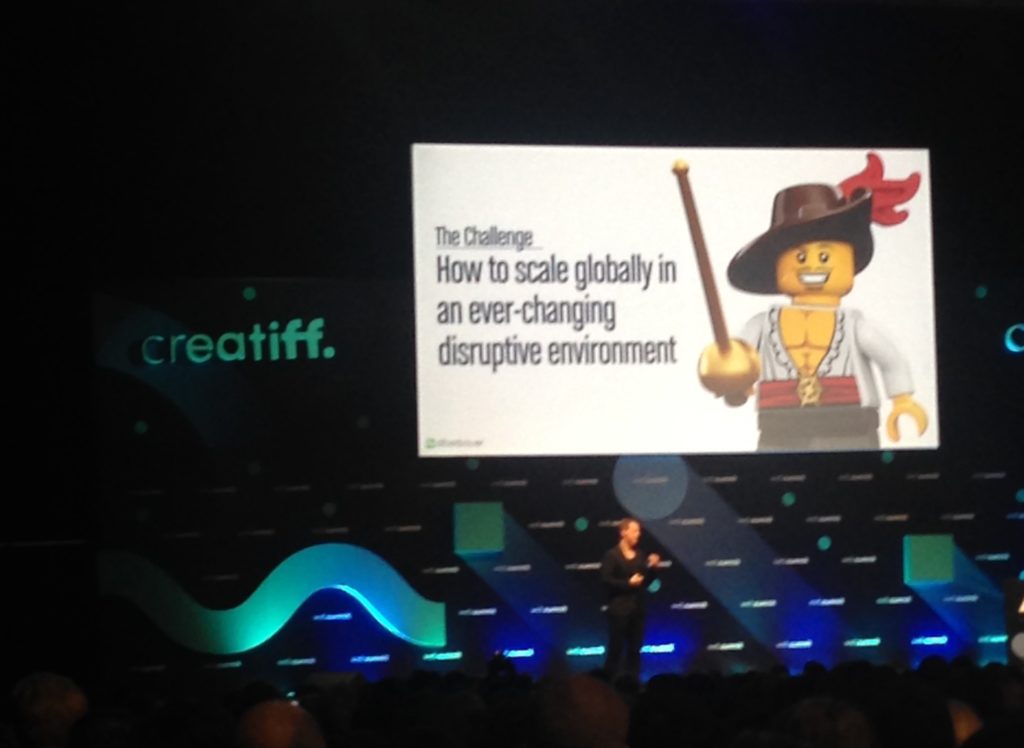Last week, I was fortunate enough to attend Web Summit (one of the largest tech conferences in the world with 60,000 attendees) held in Portugal’s lovely capital Lisbon for the second year running. I was able to attend thanks to purchasing one of the heavily subsidised ‘women in tech’ ticket a few months back: which makes it much more affordable for women to get involved.

Web Summit is by far the largest and most international conference I’ve ever been to. To be honest, the first day was actually a little overwhelming, as there are four large arenas of stands and talks; but I soon got into it. As with most conferences, despite the long list of amazing talks I was fortunate enough to attend, it’s often the conversations with fellow peers and new acquaintances over lunch, or after the conference, which leave you feeling most inspired. We had a buzzword bingo board running for the event, and the term ‘disrupt’ was well and truly awarded the most overused word during the summit!
Standout talks for me were from representatives of Lego, Reddit and Stack Overflow. Key themes of the conference included consumers taking back control over their privacy, the opportunities presented by AI and new technologies such as Blockchain and the importance of digital literacy and de-mystifying the world of tech. The conference left me feeling inspired and excited to be working as a ‘woman in tech’. Here’s a few of my take home points from the talks I chose to attend:
1) We need to be mindful of ‘echo chambers’
Steve Huffman (CEO of Reddit) talked about the importance of being mindful of ’echo chambers’ (a metaphorical description of when beliefs are ‘amplified’ by communication inside a defined system such as Reddit and social media). Social media is increasingly fuelling such echo chambers, and is causing users to reinforce their own political opinion. Companies like Reddit are however, working hard to make users more self-aware of this.
“Variety is the spice of life, we want our users to see other peoples’ opinions” Steve Huffman, CEO of Reddit
This talk got me thinking about the importance of ‘neutrality’ and starting with a ‘level playing field’ when using digital tools in government. By using tool such as Dialogue to host a conversation, users are hopefully able to break away from such echo chambers.
2) The future of work is changing but we’re yet to fully embrace it
Upwork presented some really interesting findings following a recent survey they conducted with freelancers within the ‘freelance economy’. Both North America and Europe have seen a huge growth in the number of freelancers over the past five years: enabling more people to adapt work around their lives rather than life around their work. Finding number one, was to move away from calling it the ‘gig economy’ which has negative connotations and instead call it ‘the freelance economy’.
Upwork also noted how we’re living in an age of paradox when it comes to where we work: we choose to live our lives in expensive cities even though we no longer have to due to technological advances in communication, for example. With the advent of the internet, we are also living in an era of lifelong learning. Employees and freelancers are choosing to build their own individual ‘skills banks’ rather than honing in on a singular skill set and career.
3) Platforms don’t always need a ‘full overhaul’
Steve Huffman and Mark Mayo (SVP of Firefox) were both humble and honest about the fact that their products haven’t been the ‘top of their game’ over the past couple of years. Both were open about the time taken, challenges and plans to make them better. Central to this was the importance of placing their users at the heart of the re-design process. Reddit for example, have chosen to keep some of the same look and feel that users love, and Firefox are designing their new browser experience for a 300 USD Acer computer because that’s what the majority of its users have.
4) We need to maintain active and effective channels of communication
Stuart Butterfield, CEO and co-founder of Slack, gave a fantastic talk on the importance of continually innovating and re-inventing ‘channel use’. Slack itself has thousands of channels which they actively use internally: including handy ‘triage’ channels which help direct queries and unblock communication between teams. Tools such as Slack are helping to re-invent the way people work: and this isn’t just down to the features included in the product, it’s down to the way that their users are adapting processes around the tool.
5) We need to re-build consumer trust
There were lots of talks and comments during discussions at Web Summit about ‘taking back’ and re-gaining consumer rights over privacy. However this message of distrust is also having a negative effect on the demand for new features and innovation. Joel Spolsky (Co-Founder and CEO of Stack Overflow) noted how consumer curiosity drives the demand for innovation, but if users increasingly want their information to be out of view (Stack Overflow are in the process of building an internal view for example) technological advances will suffer as a result.
6) Women need to ask for promotions more
During a talk on diversity in tech, Blake Irving (CEO, GoDaddy) spoke about how women are far less likely to actively push for a promotion. Blake talked about the importance of peer reviews and effective channels of communication to help enable this. This was also a theme I overheard three different groups of people talking about during the conference. Women in tech: let’s encourage each others to push for promotions!
7) We need to ‘de-mystify’ technology

Rebecca Parsons (CTO, Thoughtworks) gave a fantastic closing speech titled ‘everybody code now’ where she advocated for the importance of ’empowering more people to understand exactly what it is that we’re doing when it comes to tech’. She noted how we’ve lost touch with how computers work and have been built: citing how the inventor of the Raspberry Pi wanted to create something that his students could use to grasp how computers work.
“If we can think of technology as something that we play with then you can empower people.” (Rebecca Parsons, CTO, Thoughtworks)
Not everyone needs to learn to code, they need to learn to ‘appreciate code’: if you can understand what it does, then that gives you the power over it, rather than the other way around.
8) We need a diverse workforce
Lars Silberbauer (Global Director of Social Media, Lego) talked about the fantastic diversity used in their approach to marketing in his talk titled ‘levering the creative power of communities’. By using real life metrics and a diverse work force, Lego are able to use different channels and tools to help drive their global brand experience. Rebecca Parsons also echoed the importance of having a diverse workforce, noting that “real problems will be solved by a diverse group of people coming together and using technology as a tool.”

The best thing about Web Summit for me? Having 170+ nationalities all in one conference centre and genuinely feeling part of a global tech community. Massive thanks to WebSummit for offering the women in tech tickets for a second year in a row and to Delib for letting me take time out to experience such an amazing conference.